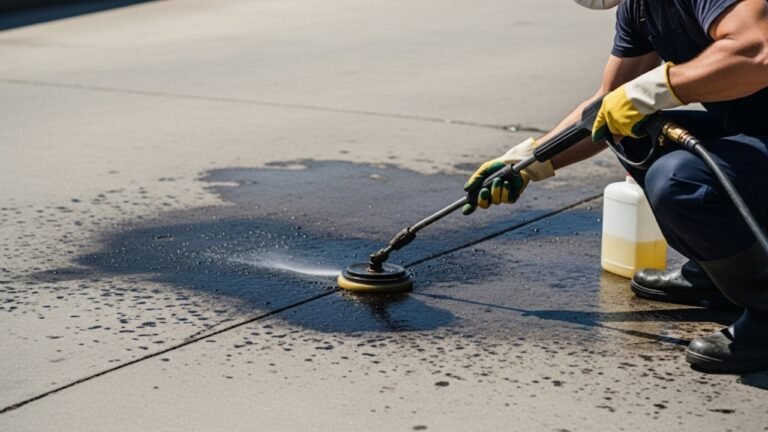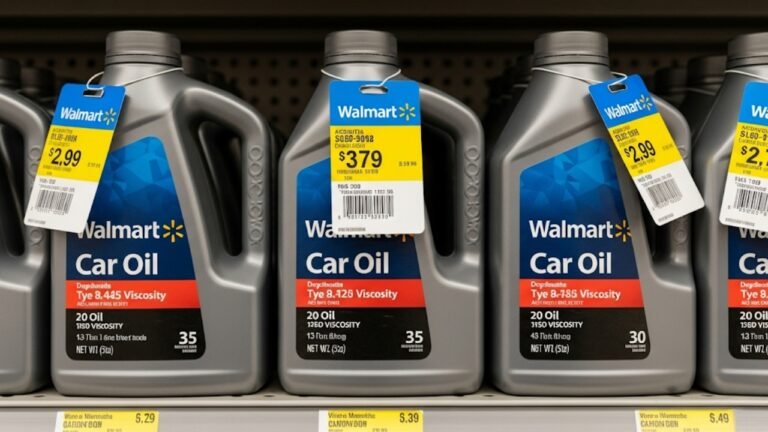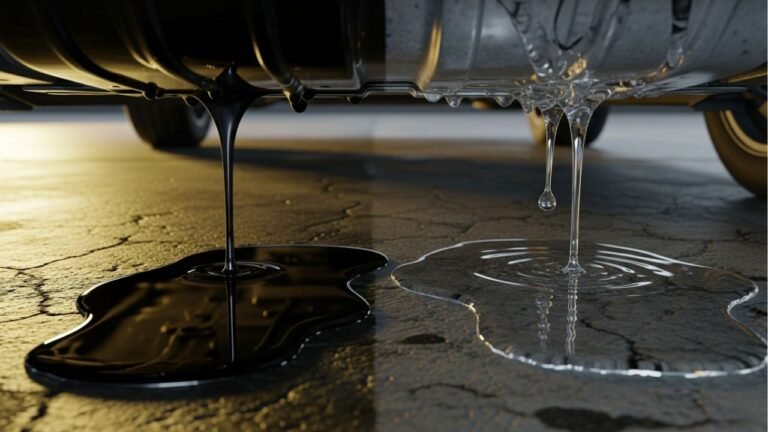How to Clean Car Oil Off Garage Floor: A Simple, Friendly Guide

Have you ever stepped into your garage, coffee mug in hand, and spotted a nasty black puddle under your car? That moment hits hard, like dropping your phone screen-down. You might wonder if you’ll ever get that ugly oil stain out of the concrete. It can feel frustrating — I’ve been there too. But don’t worry, friend: there are easy, tested ways to handle how to clean car oil off garage floor without going nuts.
This guide will walk you through the why, what, and how with step-by-step advice, funny bits, and practical tips, just like a buddy helping you out. We’ll look at affordable fixes, store-bought products, natural solutions, plus long-term prevention.
So roll up your sleeves, grab a rag, and let’s rescue your garage floor together!
Why Those Oil Stains Drive Us Crazy

When I first had to figure out how to clean car oil off garage floor, I felt overwhelmed. I tried hot water, harsh scrubbing, even a power washer — but the black blob just laughed back. Then I learned a little chemistry and some common-sense methods that worked. Concrete is porous, like a sponge, so you can’t just “wipe” oil away. You need to lift it out.
If you let the stain stay, it might damage the floor’s sealant. That means a bigger mess, higher costs, and — trust me — a headache you don’t want. So, best to act fast.
How to Clean Fresh Oil Spills: Beat the Clock
Picture this: you catch the spill while it’s still wet. That’s the dream, because fresh oil is much easier to clean. Think of it like catching sauce before it dries on your white shirt.
Here’s how you tackle it fast:
-
Cover the spill right away with kitty litter, baking soda, or sawdust. These act like mini-sponges.
-
Let it sit for 15-30 minutes. If you have time, leave it longer.
-
Sweep up the absorbent with a broom and dustpan.
-
Mix a bit of dish soap with hot water in a bucket.
-
Scrub with a stiff nylon brush in circles — like waxing a car.
-
Rinse with clean water.
This method works well if you move fast. The longer oil sits, the deeper it seeps.
Pro tip: Always wear gloves. I learned the hard way that used motor oil can irritate skin, and it’s not a fun way to end the day.
Set-In Oil Stains: The Concrete Monsters
OK, what if the stain is old and crusty, like a leftover pizza slice you forgot in the fridge? Then you need a more powerful plan.
I tried a dozen hacks for how to clean car oil off garage floor and found these work best:
-
Buy a commercial degreaser. Brands like Simple Green or Purple Power are solid choices.
-
Apply a thick layer over the stain.
-
Let it sit for 30-60 minutes so it can break down the oil.
-
Scrub hard with a stiff brush.
-
Rinse with hot water and repeat if needed.
In really bad cases, a concrete cleaner from a hardware store might be your next best friend. Check the label to be sure it’s safe for sealed or unsealed concrete.
Old-School DIY Methods That Still Rock
If you don’t want store-bought chemicals, you can go old-school with things found in your kitchen. That’s right — your grandma’s pantry might save your garage floor.
Try this natural method:
-
Make a paste with baking soda and water.
-
Smear it over the oil stain like frosting.
-
Scrub with a toothbrush or a nylon brush.
-
Pour vinegar on top (watch the fizz!).
-
Let it bubble for 10 minutes.
-
Rinse with hot water.
It’s a cheap way to tackle small or medium oil stains. And it’s satisfying — like a little science experiment.
Why Soap Alone Often Fails
I’ve heard plenty of folks say, “Oh, just use dish soap.” Well, dish soap helps but usually doesn’t break down old, sticky oil because it can’t reach deep enough.
Imagine oil soaked into a dry sponge. A little soap on top won’t clean the inside. That’s why degreasers, poultices, and absorbents work so much better.
Still, dish soap has its place as a finishing wash after stronger chemicals do the heavy lifting. Think of it as the final polish.
A Quick-Glance Table of Cleaning Methods
Here’s a handy table to keep in your garage:
| Method | What It Works Best For | Time Needed | Pros | Cons |
|---|---|---|---|---|
| Kitty litter/sawdust | Fresh wet spills | 30 minutes | Cheap, easy | Won’t clean deep stains |
| Degreaser spray | Medium to old stains | 1 hour | Powerful, proven | May need repeat applications |
| Baking soda + vinegar | Natural mild stains | 1 hour | Non-toxic, cheap | Won’t work for heavy stains |
| Concrete cleaner | Toughest deep-set stains | 1-2 hours | Professional-grade | Can be expensive |
Keep this chart handy. You’ll thank yourself later.
Cleaning Oil With Pressure Washers
People sometimes ask me, “Can I just blast it with my pressure washer?”
Here’s the honest answer: yes, but with caution. A pressure washer can push oil deeper into unsealed concrete if you’re not careful.
First, treat the stain with a degreaser or kitty litter. Then rinse with a pressure washer on a medium setting. Keep the nozzle moving — like painting a wall — to avoid damaging the floor.
And if your garage has fancy epoxy or a sealant, be even more careful. High pressure might chip or crack it. I had a neighbor who basically etched circles in his floor by holding the sprayer too close.
The Emotional Side of Garage Messes
You might laugh, but cleaning oil off a garage floor is almost…emotional. It’s the place where you tinker with your car, fix up the mower, or teach your kid to change a tire. When a stain hits that spot, it feels personal.
That’s why I believe cleaning up is more than a chore. It’s respect for your workspace. I remember my dad showing me how to scrub out an oil spill after I overfilled the engine. It was messy, but I still smile thinking about it. These small rituals keep your garage yours, and protect it for years to come.
Bullet Points: Must-Do Steps
Here’s a fast checklist:
-
Act quickly on fresh oil
-
Use kitty litter or sawdust
-
Scrub with degreaser for old stains
-
Try baking soda + vinegar for a natural option
-
Avoid harsh chemicals on sealed floors
-
Rinse thoroughly
-
Repeat if needed — patience pays off
More Prevention, Less Stress
Before we talk about polishing and sealing floors in the second half, let me remind you: prevention is everything.
Use these habits:
-
Place a drip pan under your car
-
Inspect for oil leaks every season
-
Fix worn gaskets ASAP
-
Clean up spills the moment they happen
-
Consider sealing your concrete
It’s like wearing an apron while cooking — a simple move saves a world of hassle.
Polishing and Sealing: Giving Your Garage Floor a Fighting Chance
Once you’ve cleaned the oil, you might notice that the floor still looks dull or stained in places. That’s because concrete, even after a scrub, can have leftover discoloration. This is where polishing or sealing comes in.
A concrete sealer acts like a raincoat for your garage. It keeps oil, coolant, or even winter road salt from soaking in. Think of it as a shield for your workspace. You can pick from penetrating sealers, which go deep into the concrete, or topical sealers, which leave a clear protective layer.
I remember applying a topical sealer in my own garage. The smell was strong (crack open a window!), but after it cured, I could see oil bead up like water on a waxed car hood. It made cleaning next time a total breeze. It’s worth every penny and a weekend of elbow grease.
Dealing With Stubborn Stains: The Poultice Method
Maybe you’re dealing with a stain so bad that even degreasers gave up. It happens — especially with older garages where oil sat for years. In that case, you can use a poultice.
A poultice is a thick paste that pulls the oil up from inside the concrete. Here’s how:
-
Mix baking soda or powdered clay with a bit of dish soap and water.
-
Spread it over the stain like cake batter.
-
Cover it with plastic wrap and tape down the edges to keep it moist.
-
Leave it for 24-48 hours.
-
Scrape it off and rinse.
I once had to do this on an old oil stain the size of a dinner plate, and while it looked silly at first, it worked better than any spray cleaner.
Environmental Considerations: Being Kind to Your Planet
When you clean oil, you also need to think about where the rinse water goes. Washing motor oil down the driveway into a storm drain is a no-go. That water often flows straight to local creeks or rivers, harming wildlife.
So, sweep up absorbents and throw them in a sealed trash bag. If you rinse the floor, try to do it on grass or gravel where it can filter through the soil instead of racing into storm drains.
If you use a degreaser, check the label for eco-safety. Many brands today are biodegradable and won’t poison the water system, which is awesome.
A Story: My First Big Spill
I’ll never forget the first time I changed my own oil. I was maybe 19, proud as a peacock, until I knocked over the drain pan and sent a river of black oil across the floor. Total panic.
My dad heard me yell and came running. We dumped kitty litter, laughed until our sides hurt, and ended up turning it into a lesson. That day taught me how to clean car oil off garage floor the hard way, but it stuck with me for life.
That’s why I encourage you to see these mistakes not as disasters but as learning moments. They build skills, save money, and build confidence for the next project.
Cost Breakdown: What You Might Spend
Here’s a quick estimate, so you know what to budget:
| Item | Approximate Cost |
|---|---|
| Kitty litter | $5–$10 per bag |
| Degreaser | $10–$20 per bottle |
| Concrete cleaner | $15–$30 |
| Nylon brush | $5–$15 |
| Concrete sealer | $30–$60 per gallon |
Overall, you can clean most spills under $20 if you move fast. But if you need a full deep clean and reseal, you might invest $100 or so.
The Cultural Meaning of a Clean Garage
In many cultures, the garage is more than a parking spot. It’s a workshop, a hangout, a place to teach skills or fix things with your kids. A dirty garage floor feels like a neglected kitchen.
When you know how to clean car oil off garage floor, you protect a space where memories happen — rebuilding an old bicycle, fixing your buddy’s brakes, tuning a mower. It’s respect, tradition, and pride.
Keeping that floor clean shows love for your tools, your car, and your family.
FAQs About How to Clean Car Oil Off Garage Floor
Q1. Can I just pour bleach on an oil stain?
Nope — bleach doesn’t break down oil. It can even damage your concrete or release dangerous fumes. Use a degreaser instead.
Q2. Will baking soda alone work for deep stains?
Not really. Baking soda is fine for mild, fresh spills but needs help from vinegar or a degreaser for older stains.
Q3. Is pressure washing safe for epoxy floors?
Use a low setting. High-pressure water can crack epoxy if you hold it too close.
Q4. What’s the cheapest method to clean oil?
Kitty litter or sawdust is dirt-cheap and works great for fresh spills.
Q5. Do I have to seal my garage floor every year?
No, every 2–3 years is usually enough unless your garage sees heavy traffic.
Q6. Can I use laundry detergent to clean oil?
Some people do, but it’s weaker than a degreaser. Use it for a final polish, not the heavy lifting.
Q7. Will car oil stains come back after cleaning?
Not if you fix the leak and seal your concrete. Otherwise, new leaks will make a new stain.
Metaphor: The Garage Floor as Your Stage
Think of your garage as a stage, your car as the star, and the tools as your supporting cast. When there’s a giant ugly oil blotch, it’s like a coffee stain on a brand-new shirt — distracting and disrespectful.
A clean garage floor gives your car the spotlight it deserves.
Emotional Close: A Sense of Triumph
When you finally scrub out a nasty oil stain, it feels like winning a small battle. You took control of chaos, you protected your concrete, and you kept your workshop beautiful. That’s something to celebrate.
Every time you walk into a clean garage, there’s a deep satisfaction, almost like a fresh start. Don’t underestimate that feeling — it can make you excited to tackle the next project.
Final Words: You’ve Got This
Next time oil leaks out and tries to stake a claim on your floor, you’ll know exactly what to do. You’ve got the steps, the products, the backup plans — and the confidence.
How to clean car oil off garage floor doesn’t have to be scary or complicated. Act quickly, use smart tools, seal afterward, and respect the space.
Your garage will thank you, and your future self will too.






